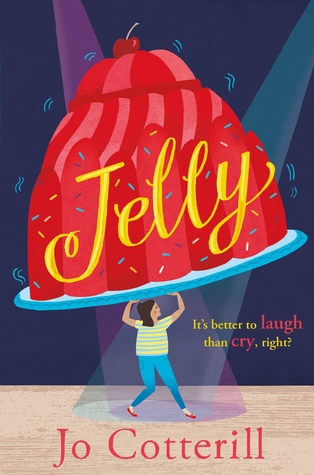“A walrus,” he says, and his mates start to snigger.
“A walrus,” I repeat. A chill races through my veins, and my hands tremble slightly. Walruses are big and fat. I look down at myself, wider around the waist than any of the other girls in my class. Will and his mates are now openly laughing – and waiting to see what I’ll do.
The thing is, when people say hurtful thing to you, you have a choice about how you respond. Option One is the most obvious: tell them what they said was hurtful, and ask them to apologise.
I never take Option One.
Option Two: laugh it off.
…Will’s face lights up in delight.“Hey, that’s really good! You totally look like one! Put that in your act!” He and his friends run off, laughing – but now they’re laughing with me, not at me.
That’s why I always take Option Two.
– from Jelly, by Jo Cotterill
Dear TBR…
I’ve been on a mission to dig into books that examine real-life issues that face young readers, and specifically, issues which stymied me particularly as a tween and teen. I’m very interested in novels which feature a religious family, or conservative religion, destructive family dynamics, various conflicting identities, and body image. Recently I’ve begun looking for “fat rep” books which position readers to critically engage with current stances our culture is taking and how we as people, fat and non-fat, can and should navigate them. This book would have been one I would have wanted to own as a kid… a fat kid who secretly wrote in a journal? Sign me up, please. I would have started writing bad poetry much earlier as well!

This book comes from the UK. (American readers might experience a millisecond of bemusement about the title; gelatin desserts like Jell-o in the UK are called Jelly, which is why there’s a picture of a jelled gelatin dessert on the cover.) British books tend to be more straightforward about adult matters in children’s books, and the subplot about daughter Anjelica – or, Jelly, as she prefers – watching how her mother inhabits an “Everything’s fine!” space when her boyfriend is clearly trash was …painful, but realistically and well done. Additionally, there are moments of adult-and-child interaction between Jelly teachers and strangers and acquaintances which underscore some of the satisfying and disturbing ways kids interact with adults on the daily. The power dynamic between adults and children is never in their favor – another thing which frustrates the bright eleven-year-old Jelly.
Of course, what really focused my attention was how Jelly is described. The reader’s first view of her is clowning for her friends at school. And then, after the bell, when she’s had an annoying interaction with another classmate, she remarks on how tired she is, once the school days is done.
Sometimes people are resistant to reading about or hearing about microaggressions, but this is a prime example of the effect of them. Jelly deals with the baiting teasing by disarming the teaser with laughter, or hastily assuring the speaker that she knows they didn’t mean any harm with their ill-spoken comments, but … it costs. Every single time, it costs.
This book is funny and heart-warming, but I hit a certain point with it where I just seeped tears – not because a moment was particularly sad, though there were some painful bits sprinkled routinely – but because so much resonated. Jelly is brilliant – but self-destructive in a way that feels inevitable and inescapable. The author really “gets” adolescent struggles with body image and confidence, and portrays Jelly’s desire to basically rip off her own skin and hide underground – not because of how she feels in that body or how she looks to herself, but because she’s sure she’s disappointing and doesn’t measure up to societal expectation. There’s a lot of fodder for discussion and reflection in these pages, and this would be a wonderful Book Club selection for kids, or parents-and-kid clubs to share.
Though the field of children’s books is crowded and busy and loud, this quiet, steadfast, warm and funny book is the type that SHOULD rise to the top, and fingers crossed that long may it reign and jump the pond and succeed as well. Published in 2018, it’s worth noting that JELLY is a girl who is fat at the beginning, middle, and the end of the book. And that’s just fine.
Until the next book,
A Reader
